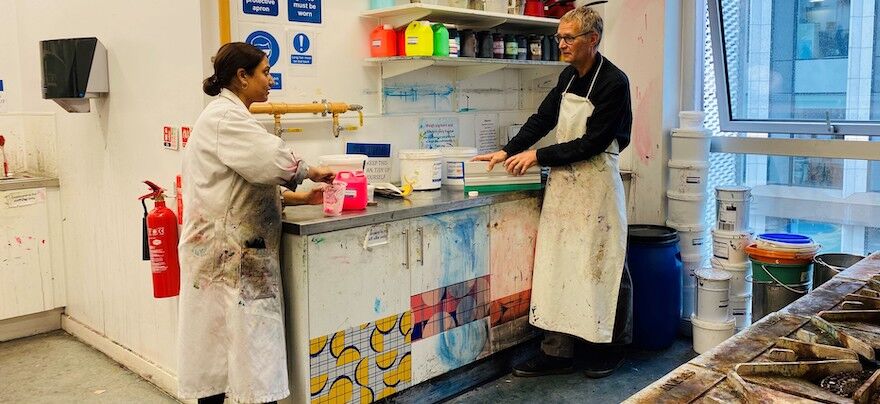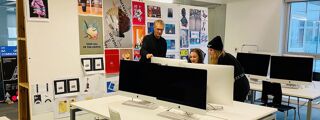Principal Lecturer in Visual Communication Professor Andrew Kulman shares his advice about joining onto one of our Visual Communication courses, and talks about why he loves working in the creative industry.
A little about me…
I’ve been involved in art education since 1989 but to be honest I feel I’ve never ever been away from it, I loved my time on my Foundation course, then on my degree and after that I couldn’t wait to study for a postgraduate award. I put this down to having a passion for all things creative and that’s what I now look for in an applicant’s portfolio, that desire to create and express yourself through text and image, designs, photographs, films and drawings.
How can applicants show this in their portfolio?
The best way to show this is through sketch books or as we call them Reflective Visual Journals (RVJ). The term RVJ says it all, it’s a journal, like a diary only its visual so full of pictures, photos and words. It’s also reflective which means you can look at the content and analyse it and reflect on why you made the work.
Why choose Visual Communication?
If you choose to study visual communication, you’re making a real choice and commitment to be involved with the creative industries and to enter a world where your ideas and imagination are your strength and currency. All employers are looking for agile, creative thinkers and you will be well-placed to meet these expectations.
What does a Visual Communications course offer?
We actively support students who have chosen to become Graphic Designers, Illustrators, Theatre Designers, Photographers, Advertising Creatives because we are from that background too. I spent years working in London as a freelance illustrator, working with clients such as the BBC and Vogue, producing children’s picture books and it’s this knowledge that I now pass onto our students. We also have a good network of professionals who we can call on to come into the classroom and give students expert advice whether it’s about presenting a good portfolio or showing you photographic darkroom techniques. This kind of experience is priceless and its why students come to study with us.
What advice would you give to students beginning their studies?
What advice would I give? Well, whilst you are studying a creative and exciting subject, no one says its easy and there will be times you get a ‘creative block’ or things don’t go to plan. This is natural and happens to us all but remember if you keep working it will lead to something. Nothing is a mistake, there’s no win and no fail. There’s only make!
 What can applicants expect to get out of the course?
What can applicants expect to get out of the course?
For many of you you’re on a three year journey, you will meet really inspiring people. Fellow students, teachers and technicians, you will visit new, exciting places and learn to think independently. This is what we call a transformative experience as you’ll be a different person when you leave to who you were when you first arrived. We’ll give you the confidence to leave with a great portfolio, having the ability to present yourself for employment or further study. Remember you gain both subject expertise but also a load of transferable skills, such as meeting deadlines, time management, networking and writing skills to name but a few.
What extra support is offered to students?
Students studying at BCU benefit from the teaching staff who offer far more than just subject expertise, they also have support from technicians in Photography, Moving Image, IT and printmaking. We are fortunate that we have English writing support from colleagues in CLiC (which stands for Culture and Language in Context) offering workshops in things like critical thinking, presentation skills and academic writing. We know a lot of students struggle with the writing components simply because academic writing has different requirements so we have made sure we can enable students to meet these with confidence. Student support services offer pastoral support and we work closely with the student success advisors to monitor student wellbeing and safety. I’ve been really impressed with the work these teams do and together with academic teaching staff they form a great partnership.
What have been your highlights at BCU?
If I was to name all the highlights since I’ve been working at BCU we’d be exceeding my word count, but it’s fair to say that personally I’ve enjoyed being part of the extra-curricular activities. Student study trips to New York are always value for money and create great memories of being at University but day trips to Oxford and London are equally important for that special sense of belonging. I particularly like taking part in master class skills workshops, whether it is learning about calligraphy or character design. Students get to meet really interesting practitioners from the fields of animation or photography and by taking part in the workshops they learn by doing. I’ve had the pleasure of working in the wonderful School of Art, a Victorian architectural masterpiece known affectionately as Hogwarts and working in the ultra-modern studios of the Parkside Campus, something I feel privileged to say.
Visual Communication
Find out more about our courses





